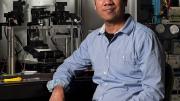Sight and hearing seem most important in guiding human behavior—but for many animals, including the mice Venkatesh Murthy studies in his lab, the sense of smell often dominates. A dozen years ago, this prompted a question that he still seeks to answer: “What is the smell world? It’s not very intuitive how this works in the brain. It seems like just a bunch of chemicals, yet animals group those chemicals into objects”: food, predators, potential mates. Human brains do the same, he adds. Evidence suggests a link between mood disorders and sense of smell, and loss of smell can be an early symptom of Alzheimer’s (and also, apparently, of COVID-19, a discovery that intrigues him). For the Erikson life sciences professor of molecular and cellular biology, these mysteries have always been an attraction. The son of an engineer, whose industrial hometown in southern India was planned by engineers (“so very clean and organized”), he, too, studied engineering in college before realizing halfway through that his interests lay elsewhere. Arriving at the University of Washington, Seattle, for graduate school, he was at first drawn to artificial intelligence, but found studying the brain itself more compelling (an exploration that continues in other ways at home, where Murthy plays guitar—“I adore jazz”—and reads poetry). This July he became Finnegan Family Director of Harvard’s Center for Brain Science, which brought him, unexpectedly, back to AI: “One thing we would like to move forward in the next decade is really understanding the basis of intelligence,” he says. In experiments, he has seen mice pick out specific, often subtle, smells amid an “olfactory cocktail party” of distracting odors. “It’s quite easy for them, actually….So, the question is, is there something in the way their brains are doing this that can inspire artificial intelligence systems?”
Harvard Portrait: Venkatesh Murthy
Harvard Portrait: Venkatesh Murthy
A brief look at what animals’ sense of smell reveals about the brain

Venkatesh Murthy
Photograph by Anna Olivella
You might also like
Regenerative Biology’s Baby Steps
What axolotl salamanders could teach us about limb regrowth
Why Humans Walk on Two Legs
Research highlights our evolutionary ancestors’ unique pelvis.
The Secrets Glaciers Tell
A Harvard class explores the glacial legacy of pollution emitted by the Roman Empire
Most popular
Explore More From Current Issue

A Near-Perfect Football Season Ends in Disappointment
A loss to Villanova derails Harvard in the playoffs.

The Trouble with Sidechat
No one feels responsible for what happens on Harvard’s anonymous social media app.

A Forgotten Harvard Anthem
Published the year the Titanic sank, “Harvard’s Best” is a quizzical ode to the University.





